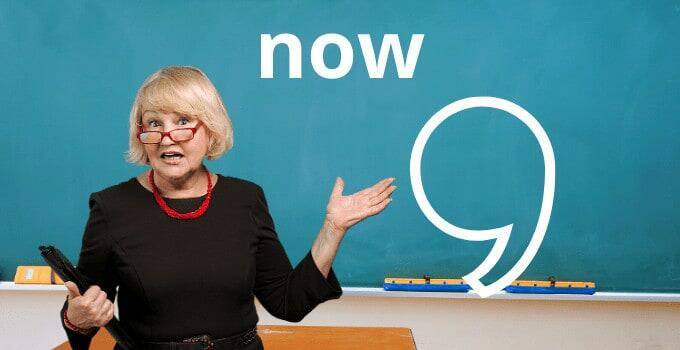Some words are more common than others. Others just sound cool. No matter whether a word is as typical as “and” or as unusual as schadenfreude, however, one thing that doesn’t change is commas. That’s because, contrary to popular belief, what determines the rules for comma usage is not the word itself but the part …
Comma
No matter how many times you use the word now and commas together, you might still get confused about whether you are doing the right thing. You are not the only one experiencing this. English can be a complicated language with complex punctuation rules, especially when it concerns comma usage. In this article, we are …
Some people would say that oral speech is more difficult than writing; however, others also think the other way around. In writing, punctuation rules are one of the most vexatious concerns. Punctuations, such as commas, provide further meaning to the reader because of their ability to alert the initiation of pauses. Pauses are then essential …
Commas can be tricky. On top of that, “thus” can be a tricky word. “Thus” can mean “in this way” or “like this.” It can also have the same meaning as the words “consequently,” “therefore,” and “as a result of.” Knowing when a comma is needed with the word “thus” depends in part on which …
Despite popular belief, the rules for using commas in a sentence don’t depend on what comes before or after a specific word. Another common misconception is that you need a comma any time you would pause when speaking. The truth is that the purpose of a comma is to provide clarity to a sentence by …
In this article, you will learn how to use commas with the adverb “instead.” Without further ado, let’s dive right in. [toc] Do you need a comma before or after instead? A comma before “instead” is usually not needed. When instead is used as an introductory adverb at the beginning of the sentence, …
The use of commas in written English may already seem as clear as mud. Similarly, cohesive devices such as pronominal adverbs may also make a learner feel like twisting a knife. Despite being intimidating in nature, the function of commas and pronominal adverbs remains hugely the same which is to logically bind words, phrases, or …
When it comes to punctuation, the comma is probably the most used punctuation next to the period. However, unlike the period, using commas can be tricky which can lead to committing errors in their use. These mistakes can make your writing less effective, especially when readers have a harder time understanding due to the improper …
Words like yes, no and maybe are important parts of the English language despite how small they are. While you’re not likely to use these words in a written context very often, there are some situations where they can save you a lot of time and significantly aid in clarity. To use them properly, however, …









